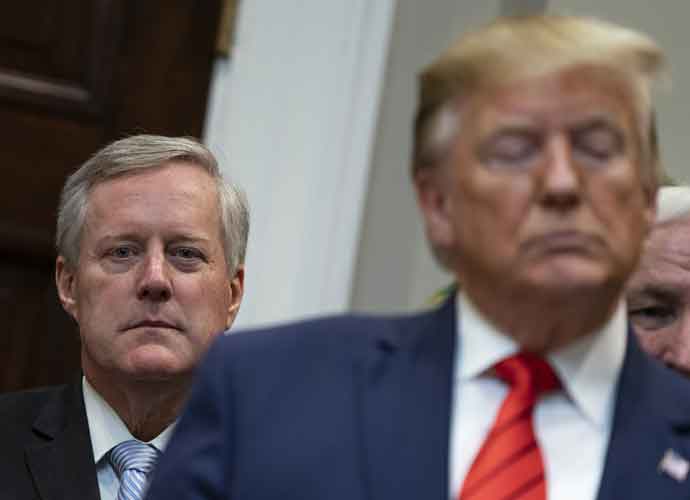

Representative Mark Meadows, a Republican from North Carolina, left, listens during an executive order signing event with U.S. President Donald Trump in the Roosevelt Room of the White House in Washington, D.C., U.S., on Wednesday, October 9, 2019. Trump warned President Recep Tayyip Erdoan not to take aggressive action in Northern Syria. Photographer: Alex Edelman/Bloomberg via Getty Images
Former President Donald Trump’s chief of staff, Mark Meadows, was denied his request to move his Georgia election fraud case to federal court. He was charged with racketeering and soliciting Georgia Secretary of State Brad Raffensperger to commit fraud on a January 2, 2021, call, following Trump’s request to “find” him enough votes to win the state.
Prosecutors have accused Meadows of unlawful behavior for attempting to change the certified vote returns in the state.
Meadows and the five others charged in the case held federal positions when the indictment’s offenses occurred. All have contended that they should be exempt from state-level prosecution and that their cases should be “removed” to federal court.
Meadows asserted that contacting state officials and arranging calls were part of his job as chief of staff.
Subscribe to our free weekly newsletter!
A week of political news in your in-box.
We find the news you need to know, so you don't have to.
Meadow believed he stood a better chance of acquittal in the federal system.
Meadows testified at his hearing with Judge Steve C. Jones that he believed Trump’s allegations of election fraud required further investigation.
Jones ruled that Meadows’ role was outside of his federal duties.
Fulton County District Attorney Fani Willis argued that Meadows had participated in a conspiracy that violated the Hatch Act, a federal law prohibiting federal employees from any engagement in political activities while working for the federal government.
Of the five defendants who filed to move his case to federal court, Meadows was expected to have the best chance of success. Meadows’s lawyers were insistent that his job required difficult decisions within a gray area between policy and politics. However, when asked to define the limits of his authority, Meadows was unable to provide a definitive answer. He acknowledged the fact that the lawyers present on the call with Raffensperger were campaign lawyers instead of official government lawyers.
In his ruling, Jones used Meadows’ words against him to further emphasize that said political activities were not within the scope of Meadows’ official duties.
Mike Donilon, former President Joe Biden's top political aide, informed congressional investigators that he made…
The Justice Department has filed a complaint against U.S. District Judge James Boasberg, alleging he…
The Smithsonian Institution's National Museum of American History removed a reference to President Donald Trump from…
Gov. Gavin Newsom (D-California) said Thursday he will push for a November special election to…
Dr. Vinay Prasad stepped down from his role as the Food and Drug Administration’s (FDA)…
Following the passage of the Republican Party and President Donald Trump’s “Big, Beautiful Bill,” high-income…